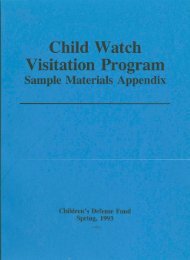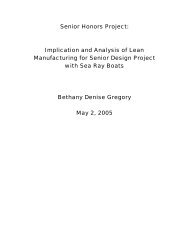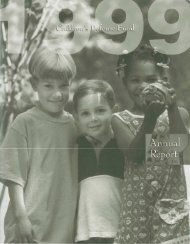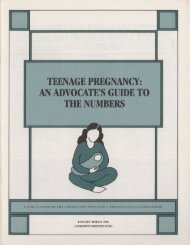children out of school in america - University of Tennessee Digital ...
children out of school in america - University of Tennessee Digital ...
children out of school in america - University of Tennessee Digital ...
You also want an ePaper? Increase the reach of your titles
YUMPU automatically turns print PDFs into web optimized ePapers that Google loves.
..<br />
families. Rather than handl<strong>in</strong>g quietly or overlook<strong>in</strong>g<br />
truancy problems as <strong>in</strong> middle-class neighborhoods,<br />
penalties are brought to bear heavily on poor<br />
and m<strong>in</strong>ority people. A black mother <strong>in</strong> Macon,<br />
Georgia noted: "I can see ... <strong>school</strong> <strong>of</strong>ficials us<strong>in</strong>g<br />
this [compulsory attendance law] to harass black<br />
people. If a person disagreed with his [the Super<strong>in</strong>tendent]<br />
hav<strong>in</strong>g the police at the <strong>school</strong> and they<br />
had a child <strong>out</strong> <strong>of</strong> <strong>school</strong> for two weeks, he would<br />
probably have them arrested." A Portuguese mother<br />
<strong>in</strong> New Bedford said the compulsory attendance<br />
laws "... are enforced for some but not others.<br />
They ignore the kids that aren't from here [low <strong>in</strong>come<br />
area]." A white mother <strong>in</strong> Portland, Ma<strong>in</strong>e<br />
said: "Kids whose mothers get state aid are sent to<br />
court more <strong>of</strong>ten if they skip <strong>school</strong> than kids <strong>in</strong><br />
families not on welfare."<br />
The enforcement <strong>of</strong> compulsory attendance provisions<br />
among non-English-speak<strong>in</strong>g populations presents<br />
even greater problems. Different lifestyles and<br />
needs, plus language barriers, <strong>of</strong>ten contribute to<br />
unfound or ignored truants. "Absenteeism is not<br />
looked upon as a bad th<strong>in</strong>g <strong>in</strong> Puerto Rico."sO<br />
"Many <strong>of</strong> the parents <strong>of</strong> the Puerto Rican <strong>children</strong><br />
have not gone beyond a third grade education. They<br />
66<br />
generally come from rural areas <strong>of</strong> Puerto Rico and<br />
did not have the opportunity for education. Once <strong>in</strong><br />
the United States, parents <strong>of</strong>ten must use their <strong>children</strong><br />
as translators, and th<strong>in</strong>k noth<strong>in</strong>g <strong>of</strong> keep<strong>in</strong>g<br />
their <strong>children</strong> <strong>out</strong> <strong>of</strong> <strong>school</strong> for the day to help them<br />
go shopp<strong>in</strong>g, visit the dentist or pick-up a welfare<br />
check. "40 One <strong>school</strong> <strong>of</strong>ficial feels it is especially<br />
difficult to keep track <strong>of</strong> New Bedford <strong>children</strong> <strong>of</strong><br />
immigrant Portuguese families from the AzQfes,<br />
where <strong>school</strong> attendance was not compulsory. The<br />
same is true <strong>of</strong> Puerto Rican <strong>children</strong>. "Changes <strong>in</strong><br />
residence, <strong>of</strong> which <strong>school</strong>s <strong>in</strong>volved have not been<br />
apprised . . . make the task <strong>of</strong> home visits and the<br />
location <strong>of</strong> the student a long and time-consum<strong>in</strong>g<br />
project. With<strong>in</strong> the past few months, serious fires<br />
have displaced many families. Urban renewal has<br />
also forced families to seek new residences, <strong>of</strong>ten<br />
with relatives and <strong>in</strong> some cases a return to Puerto<br />
Rico....41<br />
At the L<strong>in</strong>coln School <strong>in</strong> Spr<strong>in</strong>gfield, Massachusetts,<br />
the mobility rate is very high: <strong>in</strong> the first two<br />
months <strong>of</strong> the 1973-74 <strong>school</strong> year there were 247<br />
new enrollments (171 Puerto Ricans, 76 whites)<br />
and 161 dismissals (86 Puerto Ricans, 75 whites).<br />
Apparently a lot <strong>of</strong> the mobility is due to hous<strong>in</strong>g<br />
changes. With the energy crisis and a cold w<strong>in</strong>ter,<br />
the pr<strong>in</strong>cipal predicted another migration back to<br />
Puerto Rico. 42<br />
A particular attendance problem exists among<br />
older immigrant <strong>children</strong>. "Some <strong>of</strong> these boys who<br />
come from foreign countries are men and they just<br />
don't fit <strong>in</strong>. "4S<br />
The problem <strong>of</strong> heavy absenteeism <strong>in</strong> non-Englishspeak<strong>in</strong>g<br />
and immigrant or migrant communities is<br />
exacerbated by the absence <strong>of</strong> Spanish and <strong>of</strong> Portuguese-speak<strong>in</strong>g<br />
truant <strong>of</strong>ficers. In Massachusetts,<br />
none <strong>of</strong> the five districts we visited had attendance<br />
30 Interview with Sister Joyce Smith, Casa Maria, Holyoke,<br />
Massachusetts, 12/11/73.<br />
40 Interview with Sister Anne Marie, Education Coord<strong>in</strong>ator,<br />
Casa Cristo Rey, Spr<strong>in</strong>gfield, Massachusetts, 12/11/73.<br />
41 Interview with Thomas Ingham, Director <strong>of</strong> Pupil Personnel,<br />
New Bedford, Massachusetts, 11/26/73, and Richard<br />
S. Golden, Report 011 Truallcies (Holyoke School<br />
Board, Fehruary, 1973).<br />
42 Interview with John O'Malley, Pr<strong>in</strong>cipal, L<strong>in</strong>coln School<br />
and Jefferson School, Spr<strong>in</strong>gfield, Massachusetts, 12/6/73.<br />
43 lnter-:iew with Richard Nixon, Supervisor <strong>of</strong> Attendance,<br />
Cambridge, Massachusetts, 10/10/73.














